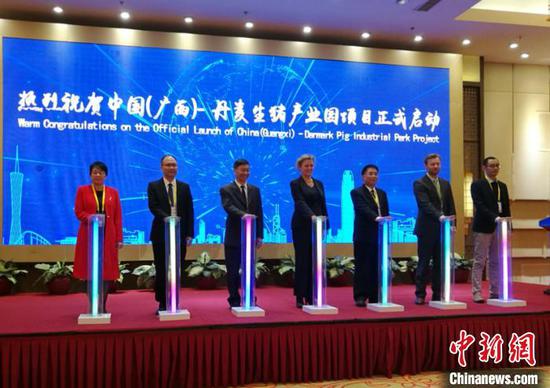Guangxi develops modern pig industry with Denmark

Guangxi and Denmark launch a pig industrial park project in Nanning. [Photo by Zhong Xin/chinanews.com]
The China (Guangxi)-Denmark Modern Pig Industry Development Round-table Meeting was held by the Danish Embassy in China and the Department of Agriculture and Rural Affairs of Guangxi Zhuang Autonomous Region in Nanning on Dec 4.
The meeting gathered government officials of Guangxi and Denmark, experts and scholars in the pig industry field, as well as industry associations and business representatives to discuss issues like the upgrading and restructuring of the pig industry, as well as strategies for large-scale pig farms to prevent and control African swine fever.
The two sides will sign a bilateral agricultural cooperation framework agreement to strengthen cooperation in the areas of mutual personnel visits, technical exchanges, and investment cooperation. They will also focus on jointly promoting scientific research institutions and enterprises to carry out the improvement of pig breeds and the sharing of intellectual property rights.
As the birthplace of the modern pig industry, Denmark supplies more than 30 million pigs to the international market every year, and its pork trade accounts for about 23 percent of the world total.
Liang Jihao, a leader of the agriculture and rural affairs department, said that Guangxi will learn from Denmark to open new models and new paths of smart pig breeding, as well as promote the modernization of the breeding industry.
The China (Guangxi)-Denmark Pig Industrial Park was also launched at the meeting. The project will introduce breeding pigs from Denmark by air, as well as carry out construction and breeding according to the standard of 100 core pig breeding farms in China. The project has a total investment of 8 billion yuan, including construction of pig breeding, industrial fattening, slaughtering, and food processing facilities, as well as other infrastructure like a fresh kitchen. After completion, it will be able to produce 5 million piglets per year, create more than 8,500 jobs, and achieve annual sales of more than 10 billion yuan ($1.41 billion).
